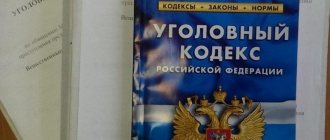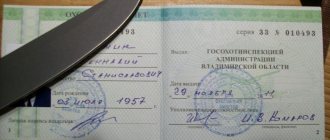Every citizen of the country must understand that for normal civilized living it is necessary to follow certain rules of behavior and be responsible for their actions. If a person commits a crime, it will be discovered and punished. This is an inevitable phenomenon, which allows us to say that every person in the country is protected by the state, or more precisely, by executive bodies such as the police. In order for the perpetrator to be held accountable for the crime committed, it is necessary to initially create an evidence base that will undoubtedly confirm the fact of his guilt or innocence.
One of the crimes is significant damage under the Criminal Code of the Russian Federation, which was caused to the other party. The criminal action consists of causing significant material damage to the injured party. This act is qualified by Art. 167 of the Criminal Code of the Russian Federation.
Criminal Code, Art. 167
In order to understand what we are talking about, let’s consider what the article of the Criminal Code says about the subject of the crime. What is significant damage under the Criminal Code of the Russian Federation?
The subject of the crime is the property of the other party (the defendant), the damage to which was, in fact, caused. That is, significant damage can be called not only the destruction, but also damage to the property of another citizen.
The subject of the crime must have a marketable value, that is, a price that can be determined by an objective method. As for the conditions under which the crime was committed, they also matter. In the modern world, we increasingly hear about terrorist acts and vandalism; for these conditions, other relevant articles of the criminal code are defined, which provide for a completely different punishment.
In order to have a clear distinction between the destruction of property and its damage, let us consider what the Criminal Code defines as the destruction of property and its damage.
Destruction of property
Destruction of property refers to the criminal actions of a citizen, as a result of which the property of another person was rendered unusable, that is, it cannot be repaired and cannot be used for its original purpose. The damage in such circumstances is "significant".
This article provides for punishment for persons aged 16 or 14 years. Moreover, it makes no difference what prompted a person to commit this crime. Also, the article does not take into account the motive for the crime, unless it is another criminal act. In this case, we can give an example. The criminal, in order to hide the theft, set fire to the house. Then he will be convicted of committing theft and damaging property at the same time.
Damaging or destroying someone else's property
If a citizen, as a result of illegal actions, damages or damages property that is owned by another citizen, then this will be qualified under Article 167 of the Criminal Code of the Russian Federation.
What is property damage? Damage is the actions of the perpetrator, which led to the partial loss of the object’s external data and performance characteristics. As a result, the damaged property requires repairs, after which it is possible to restore its original purpose.
That is, if even repairs do not help when property is destroyed, then in the case of damage after repair, the item can be used by the owner. But restoring an item will require physical effort and financial investment, and it also takes time.
Commentary to Art. 167 of the Criminal Code of the Russian Federation
The object of the crime is property relations.
An object is someone else's property (in the sense of a thing), both movable and immovable. It should be noted that the Plenum of the Supreme Court of the Russian Federation in relation to this crime gave a fundamentally different concept of someone else’s property than in relation to theft. Other people's property includes, in particular, property that is in common ownership of the perpetrator and other persons (only damage caused to other persons is taken into account) (clause 8 of the Resolution of the Plenum of the Supreme Court of the Russian Federation dated June 5, 2002 No. 14 “On judicial practice in cases of violation of fire safety rules, destruction or damage to property by arson or as a result of careless handling of fire").
If a person destroys or damages his own property in a generally dangerous way, and as a result, with direct or indirect intent, damage is caused to the property of others, the act also entails liability under Art. 167 of the Criminal Code of the Russian Federation. If, under the same circumstances, damage to someone else’s property is caused by negligence, the act is qualified under Art. 168 of the Criminal Code of the Russian Federation (in both cases, when calculating damage, only the damage caused to someone else’s property is taken into account).
The objective side includes action, consequences and causation.
The act can be expressed in any action or inaction that entailed the consequences specified in the law. The law does not specify the content of the act in this crime.
Consequences - significant property damage, expressed in destruction or damage to property. Destruction of property means rendering it completely unusable. Destroyed property cannot be restored. It cannot be used for its intended purpose. Damage is understood as causing harm to a thing, significantly reducing its consumer value. Damage to property presupposes the possibility of using it in a damaged state and (or) the possibility of restoring it to its previous condition.
Significant damage is an assessment indicator. Moreover, if damage is caused to a citizen, by virtue of Note 2 to Art. 158 of the Criminal Code of the Russian Federation cannot be less than two and a half thousand rubles. Obviously, significant damage to the organization should amount to no less. Paragraph 6 of the Resolution of the Plenum of the Supreme Court of the Russian Federation dated June 5, 2002 N 14 “On judicial practice in cases of violation of fire safety rules, destruction or damage to property by arson or as a result of careless handling of fire” states that “when resolving the issue whether significant damage has been caused to the owner or other holder of property should be based on the value of the destroyed property or the cost of restoring damaged property, the significance of this property for the victim, for example, depending on the type of his activity and financial situation or the financial and economic condition of the legal entity that was owner or other possessor of destroyed or damaged property.”
When qualifying a crime, actual damage without lost profits is taken into account. When property is destroyed, the damage is determined by its value. If property is damaged, the damage is determined by the cost of repairs, taking into account a possible price reduction. When property is damaged, if its restoration is impossible or impractical, the damage is determined as the difference in price before and after the damage. When assessing damage as a result of destruction or damage to used property, its depreciation is taken into account.
Losses are subject to compensation in full, including those not taken into account when qualifying the crime.
The corpus delicti is material. The crime is completed from the moment the damage is caused.
Intentional destruction or damage to someone else's property, committed out of hooligan motives, by arson, explosion or other generally dangerous method, entails criminal liability under Part 2 of Art. 167 of the Criminal Code of the Russian Federation only in the case of actual infliction of significant damage to the victim. If, as a result of these actions, the consequences provided for by law did not occur for reasons independent of the will of the perpetrator, then what he did if he had the intent to cause significant damage should be considered as an attempt to deliberately destroy or damage someone else’s property (Part 3 of Article 30 and Part 2 Article 167 of the Criminal Code of the Russian Federation).
The actions of the perpetrator related to the destruction or damage of property that was stolen by him represent a way of disposing of stolen property at his own discretion and additional qualification under Art. 167 of the Criminal Code of the Russian Federation is not required. No additional qualifications are required under Art. 167 of the Criminal Code of the Russian Federation and in those situations where damage to property is a method of committing theft, for example, when the culprit damages a car by opening it for the purpose of committing theft.
At the same time, if, during the theft of someone else’s property, the property of the victim, which was not the subject of the theft (for example, furniture, household appliances and other things), was intentionally destroyed or damaged, the act should be additionally qualified under Art. 167 of the Criminal Code of the Russian Federation, subject to causing significant damage.
The subjective side is characterized by guilt in the form of intent (direct or indirect), when the perpetrator is aware of the social danger of his act, foresees the possibility or inevitability of socially dangerous consequences in the form of damage and wants them to occur or does not want them, but consciously allows these consequences or is indifferent to them . Attempted crime is only possible with direct intent.
As stated above, for the existence of the crime under consideration, the perpetrator must be aware of the fact that he is destroying someone else’s property. Therefore, there is no corpus delicti in cases where such awareness is absent, for example, if the culprit purchased a stolen car, which he was not aware of, and dismantled it, then his actions do not contain corpus delicti, since as a bona fide purchaser of the car the person disposes of the car as his own property and dismantles it, without the intent to destroy someone else’s property.
The general subject of the crime is a sane person who has reached the age of sixteen. According to Part 2 of Art. 167 of the Criminal Code of the Russian Federation, responsibility begins at the age of fourteen.
Qualifying features:
1) hooligan motives;
2) arson, explosion or other generally dangerous method;
3) causing the death of a person or other grave consequences through negligence.
Part 2 Art. 167 of the Criminal Code of the Russian Federation can be imputed only if all the signs of a crime provided for in Part 1 of this article are present, including significant damage. Therefore, the destruction of low-value property in a generally dangerous manner or for hooligan reasons, which does not cause significant damage, does not entail criminal liability under this article at all. If grave consequences are caused by negligence under such circumstances, the act must be qualified under Art. 168 of the Criminal Code of the Russian Federation or according to the norms on crimes against the person (depending on the severity of the harm caused).
If there is direct intent aimed at causing property damage in a significant amount, it is possible to qualify the act as an attempted crime under Part 2 of Art. 167 of the Criminal Code of the Russian Federation, if the damage in a significant amount was not caused due to circumstances beyond the control of the person.
Hooligan motives include, for example, the desire to oppose oneself to society, the commission of an act without motive or its commission for a minor reason.
The use of fire in itself is not enough to qualify the offense under Part 2 of Art. 167 of the Criminal Code of the Russian Federation, there must be a real threat of harm to the life or health of a person or the property of other persons. Deliberate destruction or damage to individual objects using fire under conditions that exclude its spread to other objects and the emergence of a threat of harm to the life and health of people, as well as other people’s property, must be qualified under Part 1 of Art. 167 of the Criminal Code of the Russian Federation, if the victim suffered significant damage.
Although the law indicates a “generally dangerous method”, this qualifying feature is imputed not only with direct, but also with indirect intent (clause 9 of the Resolution of the Plenum of the Supreme Court of the Russian Federation of June 5, 2002 No. 14 “On judicial practice in cases of violation of fire safety rules safety, destruction or damage to property by arson or as a result of careless handling of fire"). Thus, if, when destroying or damaging someone else’s property by arson or in another generally dangerous way, the perpetrator foresaw and wanted or did not want, but consciously allowed the occurrence of such consequences of his act as the death of a person or harm to the health of the victim, the act constitutes a set of crimes provided for in Part. 2 tbsp. 167 of the Criminal Code of the Russian Federation and depending on the intent and the consequences that occurred - clause “e”, part 2 of Art. 105 or paragraph “c” of Part 2 of Art. 111 or Art. Art. 112, 115 of the Criminal Code of the Russian Federation.
A generally dangerous method is understood as a method that creates a threat of destruction of property of an unlimited number of people or a threat to their life and health (explosion, arson, flooding, etc.).
The attitude towards the consequences in the form of a person’s death can only be careless. In this case, the subjective side of the crime is expressed in the presence of two forms of guilt. With intent, liability for murder arises, which does not exclude imputation based on the totality of crimes in Part 2 of Art. 167 of the Criminal Code of the Russian Federation.
Other “grave consequences caused by negligence as a result of the intentional destruction or damage of property (part two of Article 167 of the Criminal Code of the Russian Federation) include, in particular: the negligent infliction of grievous harm to the health of at least one person or the infliction of moderate harm to the health of two or more persons ; leaving victims without housing or means of subsistence; long-term suspension or disruption of the work of an enterprise, institution or organization; long-term disconnection of consumers from life support sources - electricity, gas, heat, water supply, etc.” (Clause 10 of the Resolution of the Plenum of the Supreme Court of the Russian Federation of June 5, 2002 N 14 “On judicial practice in cases of violation of fire safety rules, destruction or damage to property by arson or as a result of careless handling of fire”).
Intentional infliction of death and any harm to health (severe, moderate, light) is not covered by Art. 167 of the Criminal Code of the Russian Federation and requires additional qualifications according to the rules on crimes against the person.
What is the punishment?
Art. 167 of the Criminal Code of the Russian Federation consists of two parts. According to Part 1, a person who is 16 years old is subject to punishment for actions that resulted in damage to someone else’s property.
In part 2 of this article, persons who have reached 14 years of age may be subject to punishment.
If the actions of the perpetrator are considered under Article 167 Part 1, then he may face the following punishment:
- fine up to 40 thousand rubles;
- a fine in the amount of wages or other income received by the perpetrator, in the amount of three months' income;
- correctional labor up to 360 hours;
- correctional labor for up to 12 months;
- compulsory work for up to two years;
- arrest for up to 3 months;
- imprisonment up to 24 months.
If the perpetrator is tried under Article 167 Part 2, then he may face the following punishment:
- compulsory correctional labor for up to 5 years;
- imprisonment for up to 5 years.
Judicial practice: sentences and punishment under Art. 167 of the Criminal Code of the Russian Federation
- Appeal decision No. 22-2865/2020... Judge Shashkin D.A. Case No. 22-91/2021 UID No. 76RS0008-01-2020 -001499-35 APPEAL DECISION Yaroslavl January 26, 2021 Yaroslavl...
- Decision of the Supreme Court: Determination No. 75-APU16-2 dated... THE SUPREME COURT OF THE RUSSIAN FEDERATION Case No. 75-APU 16-2 APPEAL DECISION Moscow May 24, 2021 Judicial Collegium for Criminal Cases...
- Decision of the Supreme Court: Determination No. 8-APU17-2 dated... THE SUPREME COURT OF THE RUSSIAN FEDERATION Case No. 8-APU17-2 Moscow March 16, 2017 Judicial Collegium for Criminal Cases of the Supreme Court...
- Decision of the Supreme Court: Determination N 45-АПУ17-6П... THE SUPREME COURT OF THE RUSSIAN FEDERATION Case No. 45-АПУ17-6з APPEAL DETERMINATION Gor. Moscow May 11, 2021 Judicial Collegium for Criminal Cases...
- Decision of the Supreme Court: Determination N 203-APU17-21... THE SUPREME COURT OF THE RUSSIAN FEDERATION Case No. 203-APU17-21 APPEAL DECISION Moscow August 31, 2021 Judicial Collegium for Military Personnel of the Supreme...
- “Review of judicial practice of exemption from criminal... REVIEW OF JUDICIAL PRACTICE OF EXEMPTION FROM CRIMINAL LIABILITY WITH ASSIGNMENT OF A COURT FINE (ARTICLE 76.2 of the Criminal Code of the Russian Federation) Federal Law of July 3...
- Resolution of the Plenum of the Supreme Court of the Russian Federation dated... PLENARY OF THE SUPREME COURT OF THE RUSSIAN FEDERATION DECISION dated December 27, 2002 N 29 ON JUDICIAL PRACTICE IN CASES OF THEFT,...
- Ruling of the ECtHR dated 02/14/2017 EUROPEAN COURT OF HUMAN RIGHTS THIRD SECTION CASE “MASLOVA VS. RUSSIAN FEDERATION” (Complaint No. 15980/12) JUDGMENT…
- Appeal ruling: Judicial Collegium for... THE SUPREME COURT OF THE RUSSIAN FEDERATION APPEAL DECISION dated July 11, 2021 N 7-APU19-5SP Judicial Collegium for criminal cases of the Supreme Court...
- Decision of the Supreme Court: Determination No. 67-АПУ17-9 dated... THE SUPREME COURT OF THE RUSSIAN FEDERATION Case No. 67-АПУ17-9 APPEAL DECISION Moscow city May 24, 2021 Judicial Collegium for Criminal Cases...
Comment on the article
The commentary to Article 167 states that Part 2 applies in cases where the actions of the perpetrator or perpetrators were committed for reasons of hooliganism. Moreover, destruction or damage to property is recognized as an intentional act. If in such a case a person was injured, then this will be considered as an unintentional infliction of significant damage or harm to health.
Liability of minors for damage to property
For intentional destruction of someone else's property, responsibility begins at the age of 16. If the destruction or damage to property was carried out for hooligan reasons and is qualified under Part 2 of Article 167, liability begins at the age of 14.
When assigning a punishment, the court must take into account the circumstances that prompted the minor to such actions, as well as his upbringing.
Sometimes the court may decide that correction of a citizen is possible through the use of compulsory educational measures. In this case, in accordance with Article 90 of the Criminal Code of the Russian Federation, the minor is released from liability.
Two sides of the crime
There are two sides to this crime - objective and subjective. The objective side is when deliberate actions were aimed precisely at ensuring that the property lost its economic and material value, which, in fact, happened.
Speaking about the subjective side, it is worth noting that this may not be a purposeful action, but a person’s disdainful attitude towards someone else’s property, which entailed a complete or partial loss of the property’s material, economic and consumer value.
In order to understand more clearly how this can happen, we will give the simplest example. A person deliberately decided to set fire to his own property, but as a result of the fire, someone else’s property was also destroyed. In this case, Article 167 of the Criminal Code of the Russian Federation applies.
Arbitrage practice
To better understand all the intricacies when Article 167 of the Criminal Code of the Russian Federation is applied, we will look at several examples of intentional damage to someone else’s property from judicial practice.
Example 1. Citizen S., who had previously been in a relationship with citizen A., upon learning of citizen A’s betrayal, crashed his car - a Toyota Corolla XII (E210) worth 1,900,000 rubles. Citizen S. smashed the windshield, right and left mirrors, punctured two front wheels, and scratched the right fender. Also, due to numerous impacts, there are dents on the left side of the car and on the hood. Citizen S. caused damage to citizen A in the amount of 75,000 rubles. The court ordered citizen S. to compensate citizen A. for damage to her car in the amount of 75 thousand rubles and compulsory work for a period of 120 hours.
Example 2. Citizen K., during a quarrel with citizen B., damaged the leather bag of citizen B. Citizen K. inflicted 4 deep scratches, which significantly spoiled her appearance. In addition, in a fit of anger, she tore out the zipper that closed the bag, which made it impossible to use it further. The amount of damage caused to citizen B. is 8,000 rubles. In view of the fact that the monthly income of citizen B. is 100,000 rubles, the court found the damage caused by citizen K. to be insignificant. Citizen K. was sentenced under Article 7.17 of the Administrative Code in the form of a fine in the amount of 500 rubles.
Example 3. Citizen R. parked in a parking lot near a shopping center. During the maneuver, he touched the car of citizen M. Citizen R. scratched the left fender and broke the side mirror on citizen M.’s car. In court, citizen M. demanded to be punished for causing damage to the property of citizen R. under Part 1 of Article 167 of the Criminal Code of the Russian Federation, arguing that that citizen R. saw that the free parking space was quite narrow and knew that he could damage citizen M.’s car, but still continued to perform the maneuver. The court rejected the request of citizen M. Due to the lack of intent, citizen R. was sentenced under Article 168 of the Criminal Code of the Russian Federation in the form of a fine in the amount of 20 thousand rubles.
Hooligan urges
If the actions of the perpetrator are hooligan in nature, then this implies the commission of a criminal act that had no reason or the reason was not significant. Hooliganism in this case is an action aimed at deliberately damaging property belonging to another person. The only goal of the offender is the desire to cause concern to others, this is often done when teenagers want to assert themselves in this way. Significant damage to an individual under Art. 167 of the Criminal Code of the Russian Federation is punished, regardless of what forced the perpetrator to do it.
If a person has not reached the age that can be held accountable, then a parent or other person who represents the interests of the perpetrator will bear it for him. This could be a guardian. Article 167 applies in situations where significant damage has been caused under the Criminal Code of the Russian Federation.
Assessment of the significance of damage
In order for a criminal act to be qualified under Article 167 of the Criminal Code of the Russian Federation, it is necessary to prove that the amount of damage allows it to be classified as significant. Legislative acts do not provide a clear distinction on this issue.
How much is significant damage under the Criminal Code of the Russian Federation? It is only noted that the minimum amount of damage that can be qualified as “significant” can be 2,500 rubles. But still, it can change depending on the level of income of the victim.
There is also no clear distinction regarding damage caused to municipal or commercial enterprises. It would be incorrect to say that “the damage caused did not have a significant impact on the injured party.” The law states that the significance of the damage caused should be determined only for the individual. Significant damage to an individual under Art. 167 of the Criminal Code of the Russian Federation is determined at a minimum amount of 2.5 thousand rubles. This is a minimum amount that does not depend on the income level of the victim.
What damage is considered significant when it comes to an enterprise or organization? When causing damage to an organization or enterprise, the most important assessment feature is the study of all the circumstances of the case under consideration. For such cases, it will be considered that the amount of significant damage in terms of cost will be in the range from 2,500 to 250,000 rubles. In each situation, this factor must be assessed individually.






